Page 2 of 3 Pages
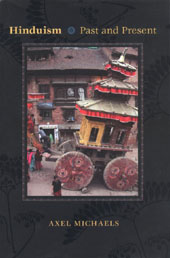
by Axel Michaels
Princeton University Press, 2003, 456 pp.
"Engaging and accessible, this book will appeal to laypersons and scholars alike as the most comprehensive introduction to Hinduism yet published."
"[An] encyclopedic survey of Hinduism that is amazing in its comprehensive charts, theoretical sophistication, and illustrative detail. . . . Michaels wants to present living Hinduism in contrast to text-dominated descriptions."
"A powerful, thoughtful, thorough presentation of Hindu traditions. The book's main purpose is to provide an overview of Hinduism and the book does this uniquely well. The work is encyclopedic in scope, but it is also analytical, and Michaels attempts throughout the book to introduce the reader not only to Hindu traditions but to major concepts in the study of religion more generally. I would recommend Michaels' book strongly to readers who want to understand Hindu traditions."
"Michaels blends his insightful arguments and probing questions with introductions to major historical epochs, ample textual sources as well as detailed analyses of major life-cycle rituals, the caste system, forms of spiritualism, devotionalism, ritualism, and heroism. Along the way he points out that Hinduism has endured and repeatedly resisted the missionary zeal and universalist claims of Christians, Muslims, and Buddhists."
See Table of Contents.
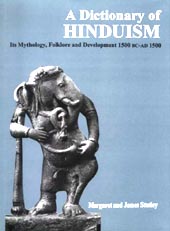
by Margaret Stutley and James Stutley
Munshirm Manoharlal, 2003, 372 pp.
"This encyclopedic dictionary has proved indispensable for all those interested in Hinduism, whether specialist, student or general reader. The dictionary comprises about 2,500 romanised Sanskrit subject headings with their English equivalents, explanations and etymology. An index of English subjects with Sanskrit equivalents, and an extensive bibliography are appended."
"The dictionary indexes and describes the mythology, folklore, religion, philosophy, literature and history of Hinduism over a period of more than two and a half millennia, thus dispelling many commonly held misguided beliefs. It reveals much of the real significance of Hinduism, which many would say shows an unsurpassed continuity and genius for analysis and synthesis. Initially an attempt to come to terms with a man's physical environment and subsequently the mysterious world beyond it, Hinduism recognized energy to be the ultimate source of manifestation, as its horizon expanded. This comprehensive work provides an invaluable survey of the long vista of Hinduism."
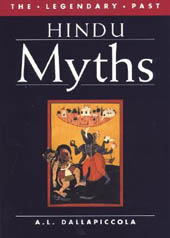
by A. L. Dallapiccola
University of Texas Press, 2003, 80 pp.
"India has long been regarded as the home of Hinduism, its mythology constituting the backbone of Indian culture. Hindu myths have been adapted over the centuries to incorporate new or revised characters, and they continue to play a central role in modern Indian life."
"Retold here in their colorful and dramatic splendor, Hindu Myths touch on the key narrative themes of creation, preservation, destruction, delusion, and the bestowal of grace. They also portray the main deities of the Hindu pantheon — Shiva, Vishnu, and Devi — and their relationships with antigods, nymphs, and ascetics. Drawn from a variety of sources, most notably the encyclopedic Puranas, the myths range from the early centuries A.D. to the sixteenth century, conveying their enduring appeal and the religious teachings derived from them."
A volume in "The Legendary Past" Series.

Translated with an Introduction by Wendy Doniger O'Flaherty
Penguin Books, 2004, 368 pp.
"This selection and translation of more than 75 seminal myths span the wide range of classical Indian sources, from the serpent-slaying Indra of the Vedas (c. 1200 BC) to the medieval pantheon - the phallic and ascetic Siva, the maternal and bloodthirsty Goddess, the mischievous child Krishna, the other avatars of Vishnu, and the many minor gods, demons, rivers and animals sacred to Hinduism. In this collection, the traditional themes of life and death are set forth and interwoven with many complex variations which give a kaleidoscopic picture of the development of almost three thousand years of Indian mythology."
See Table of Contents.
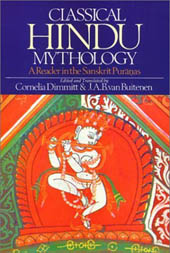
edited by Cornelia Dimmit and translated by J. A. B van Buitenen
Temple University Press, 1978, 388 pp.
"The Mahapuranas embody the received tradition of Hindu mythology. This anthology contains fresh translations of these myths, only a few of which have ever been available in English before, thus providing a rich new portion of Hindu mythology."
"The book is organized into six chapters. 'Origins' contains myths relating to creation, time, and space. 'Seers, Kings and Supernaturals' relates tales of rivers, trees, animals, demons, and men, particularly heroes and sages. Myths about the chief gods are dealt with in three separate chapters: 'Krsna,' 'Visnu,' and 'Siva.' The chapter 'The Goddess' presents stories of the wives and lovers of the gods, as well as of Kali, the savage battle goddess.
"In their introductions, the editors provide a historical setting in which to discuss Hindu mythology as well as a full analysis of its basic sources. The many names given the gods and goddesses in the Sanskrit texts have been retained since their multiplicity is an essential part of the richness of the original. The editors have provided a thorough glossary to make these names accessible."
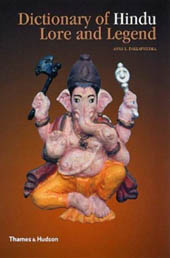
by Anna L. Dallapiccola
Thames & Hudson, 2004, 224 pp. with 243 illustrations
"Each region of India is a land in its own right, with diverse languages, customs, and cultural traditions. Yet shared social systems, firmly grounded in Hindu religious beliefs, provide the cohesive force that unites over a billion people of different backgrounds. This dictionary provides an unrivaled insight to all aspects of Hindu life with illustrated entries the elucidate the history of Hinduism, its mythology, art, architecture, religion, laws, and folklore."
"[This dictionary] offers brief alphabetical entries on all aspects of Hindu history, belief, and practice."
"Maps and entries on the major cities and places of pilgrimage in India, as well as a concise chronology and a list of principal dynasties, provide a clear overview of the geography, history, languages, and vibrant religious and cultural traditions of Hinduism. This volume will serve as a lively and essential guide for those preparing a visit to India, for Indians living in the West, for students, or for anyone interested in the subcontinent."

edited by Wendy Doniger O'Flaherty
University Of Chicago Press, 1990, 219 pp.
"Here is a collection of the original sources of the principal texts of Hinduism in English translation."
"[This book contains] a wider range than usual of Sanskrit texts: not only interesting Vedic, epic, and mythological texts but also a good sampling of ritual and ethical texts. . . . There are also extracts from texts usually neglected, such as medical treatises, works on practical politics, and guides to love and marriage. . . . Readings from the vernacular Hindi, Bengali, and Tamil traditions [serve to] enrich the collection and demonstrate how Hinduism flourished not just in Sanskrit but also in its many mother tongues."
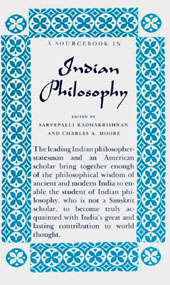
edited by Sarvepalli Radhakrishnan and Charles A. Moore
Princeton University Press, 1967, 720 pp.
"Originally published in 1957, this is basically a
sourcebook of Indian texts for the serious study of the philosophical schools of India --
very much including the religious traditions. Radhakrishnan and Moore assembled and edited
an impressive body of material, most of it in selections, with useful introductions and
helpful notes. It begins with philosophical passages in early Sanskrit religious texts,
and proceeds through their orthodox interpreters, through heterodox approaches
(materialist, Jaina, and Buddhist), and the medieval synthesizers, and concludes with a
chapter each on two modern Indian philosophers, Sri Aurobindo and Radhakrishnan
himself."
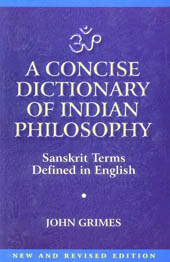
by John A. Grimes
State University of New York Press, 1996, 408 pp.
"This new and revised edition
provides a comprehensive dictionary of Indian philosophical terms. Terms are provided in
both devanagari and roman transliteration along with their English translations."
"Containing over 500 new listings of frequently used religious terms and numerous
etymological derivations, this new and revised edition of A Concise Dictionary of
Indian Philosophy provides a comprehensive dictionary of Indian philosophical terms in
both devanagari and roman transliteration along with an English translation. It offers
special meanings of words used as technical terms within particular philosophical systems
and contains the meanings of terms fundamental to epistemology, metaphysics, and practical
teaching of heterodox and orthodox schools of Indian philosophy."
"Cross-referencing is provided and charts are included that offer information
regarding relationships, categories, and sourcebooks relevant to individual schools."
"Hinduism: Introductions, Anthologies, Dictionaries & Other Resources"
Blavatsky
Bookstore
Sponsored by Blavatsky
Study Centery